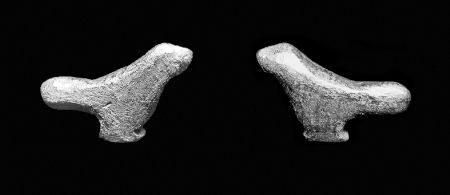Chinese archaeologists say they have identified the country's earliest known carving -- a deer antler sculpted into the shape of a bird -- dating back 12,000 to 15,000 years.

The fossilized grey figurine, which is 2.1 centimeters long, 1.2 centimeters high and 0.6 centimeters thick, was found in Xuchang County in China's central Henan Province in March.
It is made from evenly-heated antler, and vividly carved with a microlithic cutting tool.
"The carving technique is more exquisite than the western carvings of its time," said Li Zhanyang, head of the archeological team in Xuchang, and a researcher with the Henan Institute of Cultural Relics and Archeology.
Carvings of the late Paleolithic Age have been found in western countries, such as 30,000-year-old ivory horse and mammoth carvings at Vogelherd Cave in Germany, and human profile carvings at a cave in La Marche, France, that are about 10,000 years old.
The bird figurine was unique in its feet that were carved with symmetrical sockets that enable it to stand stably, said Li. "This demonstrates that human beings already had a good grip of the equilibrium principle then."
Li said the bird carving might have been left by hunters when they were very active in Henan Province around the Last Glacial Maximum period, which started about 25,000 years ago. It could have been a totem to represent good luck and freedom.
If the bird carving could be exactly dated, it would provide important background for the research on the techniques, aesthetic and expression, as well as inter-regional migration and communication of human beings of that time, said Gao Xing, head of National Natural Science Foundation of China.
The bird carving is not the first find at that site. In 2007 and 2008, Chinese archaeologists announced that they found more than 30,000 relics in Xuchang, including human skull fossils dating back 80,000 to 100,000 years.
The ancient skull was named Xuchang Man after the location. Scientists said the discovery was expected to provide direct evidence for the origins of modern Chinese and East Asian human species.
(Xinhua News Agency April 28, 2009)